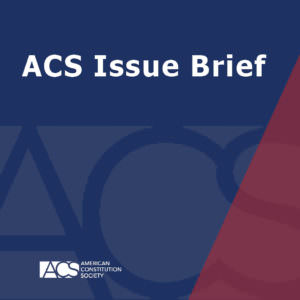The Slow, Tragic Demise of Standing in Establishment Clause Challenges
Fred H. Paulus Professor of Law, Director of the Center for Religion, Law & Democracy, Willamette University College of Law
September 22, 2011
 ACS is pleased to distribute “The Slow, Tragic Demise of Standing in Establishment Clause Challenges,” an Issue Brief by Professor Steven K. Green, Director of the Center for Religion, Law and Democracy at Willamette University. Last Term’s Arizona Christian School Tuition Organization v. Winn was the most recent example of the Supreme Court’s dismantling of taxpayer standing in Establishment Clause challenges. In Winn, the majority tossed aside on standing grounds a constitutional challenge to an Arizona law that gave tax benefits to private schools, including religious ones. In a blistering dissent, Justice Kagan said the majority’s continued weakening of taxpayer establishment clause standing may lead to “the effective demise of taxpayer standing,” which “will diminish the Establishment Clause’s force and meaning.”
ACS is pleased to distribute “The Slow, Tragic Demise of Standing in Establishment Clause Challenges,” an Issue Brief by Professor Steven K. Green, Director of the Center for Religion, Law and Democracy at Willamette University. Last Term’s Arizona Christian School Tuition Organization v. Winn was the most recent example of the Supreme Court’s dismantling of taxpayer standing in Establishment Clause challenges. In Winn, the majority tossed aside on standing grounds a constitutional challenge to an Arizona law that gave tax benefits to private schools, including religious ones. In a blistering dissent, Justice Kagan said the majority’s continued weakening of taxpayer establishment clause standing may lead to “the effective demise of taxpayer standing,” which “will diminish the Establishment Clause’s force and meaning.”
The author agrees with Justice Kagan’s assessment and argues that recent decisions are advancing the “slow death” of the ability of citizens to challenge government spending that supports religion. “By deciding not to decide certain classes of challenges, courts will effectively be throwing Establishment Clause questions … to the politically elected branches,” writes Green. “Political expediency, rather than constitutional fealty, will become the rule of law, and Justice Robert Jackson’s immortal statement about withdrawing questions of constitutional rights from ‘the vicissitudes of political controversy’ and placing them ‘beyond the reach of majorities and officials’ will be stood on its head.”
Read the full Issue Brief here: The Slow, Tragic Demise of Standing in Establishment Clause Challenges
